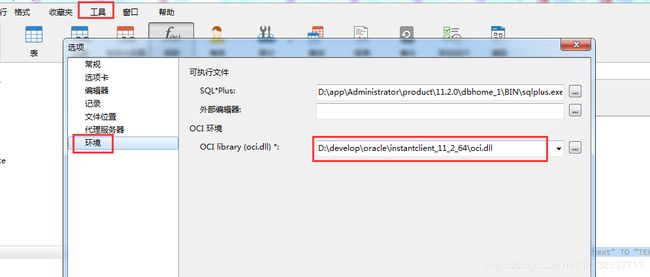oracle数据库与postgre数据库之间的互相迁移
oracle与postgre之间互相迁移之前要明白,postgreSQL中默认使用小写,oracleSQL中默认大写。迁移分成3个步骤:数据及结构迁移、迁移之后的类型及长度变化、不兼容的函数替换。
1.数据及结构迁移
1.1数据大小写同步
oracle中使用存储过程将表名和字段名称大写转成小写:
create or replace procedure to_lower is
begin
/*字段转小写*/
for t in (select table_name tn from user_tables) loop
begin
for c in (select column_name cn from user_tab_columns where table_name=t.tn) loop
begin
execute immediate 'alter table '||t.tn||' rename column '||c.cn||' to "'||lower(c.cn)||'"';
exception
when others then
dbms_output.put_line(t.tn||'.'||c.cn||'已经存在');
end;
end loop;
end;
end loop;
/*表名转小写*/
for c in (select table_name tn from user_tables where table_name <> lower(table_name)) loop
begin
execute immediate 'alter table '||c.tn||' rename to "'||lower(c.tn)||'"';
exception
when others then
dbms_output.put_line(c.tn||'已存在');
end;
end loop;
end;
oracle中使用存储过程将表名和字段名称小写转成大写:
create or replace procedure to_upper is
begin
/*表名转小写*/
for t in (select table_name tn from user_tables) loop
begin
for c in (select column_name cn from user_tab_columns where table_name=t.tn) loop
begin
execute immediate 'alter table "'||t.tn||'" rename column "'||c.cn||'" to '||c.cn;
exception
when others then
dbms_output.put_line(t.tn||'.'||c.cn||'已经存在');
end;
end loop;
end;
end loop;
/*表名转大写*/
for c in (select table_name tn from user_tables where table_name <> upper(table_name)) loop
begin
execute immediate 'alter table "'||c.tn||'" rename to '||c.tn;
exception
when others then
dbms_output.put_line(c.tn||'已存在');
end;
end loop;
end to_upper;
postgre中使用函数将表名和字段名称大写转成小写:
CREATE OR REPLACE FUNCTION "public"."up_lower"()
RETURNS "pg_catalog"."varchar" AS $BODY$
declare
t_name varchar;
t_field record;
sql varchar;
BEGIN
-- 获取该数据库下public目录下的所有表名
for t_name in select upper(tablename) from pg_tables where schemaname='public' loop
-- 根据表名获取该表的字段与字段类型
sql := 'SELECT format_type(a.atttypid,a.atttypmod) as type,upper(a.attname) as name FROM pg_class as c,pg_attribute as a where c.relname = '''|| t_name ||''' and a.attrelid = c.oid and a.attnum>0';
for t_field in execute sql loop
-- 修改更新字段
sql := 'alter table "'|| t_name ||E'" rename column \"'|| t_field.name ||E'\" to '|| t_field.name;
execute sql;
end loop;
-- 修改表名
sql := 'alter table "'|| t_name ||'" rename to '|| t_name;
execute sql;
end loop;
return '完成';
END
$BODY$
LANGUAGE plpgsql VOLATILE
COST 100postgre中使用函数将表名和字段名称小写转成大写:
CREATE OR REPLACE FUNCTION "public"."up_upper"()
RETURNS "pg_catalog"."varchar" AS $BODY$
declare
t_name varchar;
t_field record;
sql varchar;
BEGIN
-- 获取该数据库下public目录下的所有表名
for t_name in select upper(tablename) from pg_tables where schemaname='public' loop
-- 根据表名获取该表的字段与字段类型
sql := 'SELECT format_type(a.atttypid,a.atttypmod) as type,upper(a.attname) as name FROM pg_class as c,pg_attribute as a where c.relname = lower('''|| t_name ||''') and a.attrelid = c.oid and a.attnum>0';
for t_field in execute sql loop
-- 修改更新字段
sql := 'alter table '|| t_name ||' rename column '|| t_field.name ||E' to \"'|| t_field.name ||E'\"';
execute sql;
end loop;
-- 修改表名
sql := 'alter table '|| t_name ||' rename to "'|| t_name||'"';
execute sql;
end loop;
return '完成';
END
$BODY$
LANGUAGE plpgsql VOLATILE
COST 100不管哪边迁移到哪边,都需要先字段及表名大小写转化一下,如果有变化可以根据上面的sql去修改,如果表和字段过多可将字段与表名分开使用。然后使用navicat工具将两边数据库的数据表复制到另外一方,navicat连接oracle数据库注意设置:
2.迁移之后的类型及长度变化
oracle迁移到postgre后,如果oracle中类型是NUMBER,在postgre中类型为numeric(1000,53),位数特别长。需要修改其它类型可参照下面,下面函数在postgre中使用:
CREATE OR REPLACE FUNCTION "public"."up_field"()
RETURNS "pg_catalog"."varchar" AS $BODY$
declare
t_name varchar;
t_field record;
sql varchar;
BEGIN
-- 获取该数据库public目录下的所有表名
for t_name in select tablename from pg_tables where schemaname='public' loop
-- 根据表名获取该表的字段与字段类型
sql := 'SELECT format_type(a.atttypid,a.atttypmod) as type,a.attname as name FROM pg_class as c,pg_attribute as a where c.relname = '''|| t_name ||''' and a.attrelid = c.oid and a.attnum>0';
for t_field in execute sql loop
if t_field.type='numeric(1000,53)' then
-- 更新类型numeric(1000,53)的为numeric(1000,0)
sql := 'alter table '|| t_name ||' alter column '|| t_field.name ||' type numeric(1000,0)';
execute sql;
end if;
end loop;
end loop;
return '完成';
END
$BODY$
LANGUAGE plpgsql VOLATILE
COST 100如果需要对比oracle数据库与postgre数据迁移之后的数据结构,可用下面分别对应的sql执行,然后使用bcompare对比工具对比差异。
oracle查询表及字段,下面需要注意下T.database_name='你的数据库名称':
SELECT
*
FROM
(
SELECT
UB.tablespace_name AS database_name,
UTC.table_name AS table_name,
UTC.column_name AS column_name,
UTC.data_type AS column_type,
utc.data_length AS data_length,
ucc.comments AS column_comment
FROM
user_tables ub
LEFT JOIN user_tab_columns utc ON ub.table_name = UTC.table_name
LEFT JOIN user_col_comments ucc ON utc.column_name = ucc.column_name
AND utc.table_name = ucc.table_name
) T
LEFT JOIN (
SELECT
UCC.table_name AS table_name,
ucc.column_name AS column_name,
wm_concat (UC.constraint_type) AS constraint_type
FROM
user_cons_columns ucc
LEFT JOIN user_constraints uc ON UCC.constraint_name = UC.constraint_name
GROUP BY
UCC.table_name,
ucc.column_name
) b ON T.table_name = b.TABLE_NAME
AND T.column_name = b.column_name where T.database_name='你的数据库名称' order by T.table_name,T.column_nameoracle表记录数:
select t.table_name,t.num_rows from user_tables t order by table_namepostgre查询表及字段:
select
c.relname as table,a.attname as name,format_type(a.atttypid,a.atttypmod) as type
from
pg_class as c,pg_attribute as a
where
c.relname in(
select tablename from pg_tables where schemaname='public'
)
and a.attrelid = c.oid
and a.attnum>0
order by c.relname,a.attnamepostgre表记录数统计
select relname as table_name, reltuples as row_counts from pg_class where relnamespace = (select oid from pg_namespace where nspname='public')3.不兼容的函数替换
迁移之后一些函数到另外一个数据中可能就不兼容了,如oracle中的获取时间 select sysdate from dual与postgre中now函数
